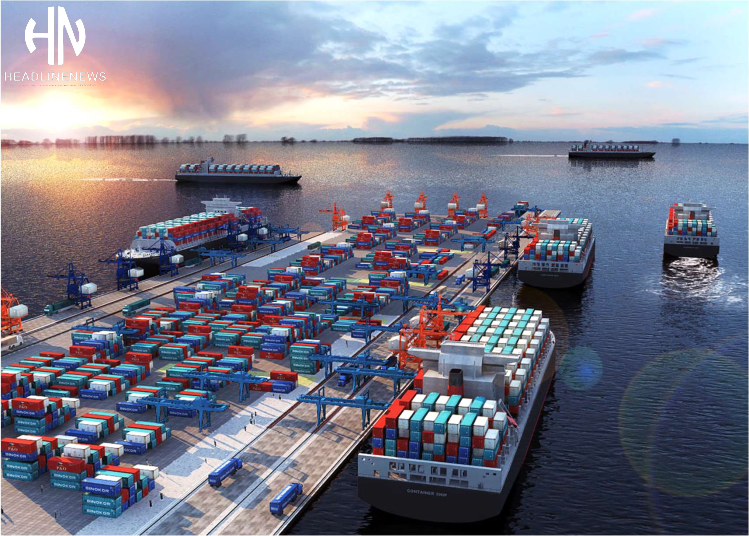A seismic shift is brewing at Lagos’ Tin Can Island Port, as the Federal Government of Nigeria appears set to bypass existing concessionaires in favor of wealthy investors from the Arab world, led by Dubai-based global logistics giant DP World, in what is shaping up to be one of the country’s boldest port reform moves in decades.
According to HEADLINE NEWS, government insiders reveal that high-level negotiations are underway to grant new concession rights to UAE-backed investors, whose multi-billion-dollar proposals are being seen as a game-changer for Nigeria’s maritime economy. The development threatens to upend the current port concession landscape, where several operators are lobbying for license renewals amid silent resistance from authorities.

DP World Leads the Charge
DP World, which operates over 90 ports and terminals in 48 countries, has emerged as the leading contender. The company is aggressively pushing a transformative plan to overhaul Tin Can Island Port into a world-class logistics and industrial hub, with supporting infrastructure such as an export-focused industrial park, state-of-the-art container terminals, and a digital logistics ecosystem.
The company’s proposal mirrors its successful operations across Africa, including deep-water ports in Senegal, Mozambique, and the Democratic Republic of Congo, where it’s riding the continent’s mineral export boom to reshape regional trade corridors.
Sources familiar with the matter suggest that DP World’s bid includes billions in capital investment, with an eye on turning Lagos into West Africa’s premier maritime gateway.

Tension with Current Operators
As excitement builds, the move is stoking anxiety among existing concessionaires whose contracts are nearing expiration. The government is reportedly stonewalling renewal requests, signaling a desire to break with past concession models that critics say have led to infrastructure decay and poor service delivery.
Only the Ports & Terminal Multipurpose Limited (PTML), under a Build-Own-Operate-Transfer (BOOT) agreement, appears to be exempt, for now.
Government sources hint that the Bola Tinubu administration is determined to establish greater operational autonomy at the Nigerian Ports Authority (NPA), while clamping down on terminal operators accused of focusing on profits at the expense of infrastructure upgrades.

Strategic Engagements at the Highest Level
DP World executives recently met with Nigeria’s Minister of Marine and Blue Economy, Adegboyega Oyetola, during a high-level visit to formalize talks. The discussions focused on a strategic public-private partnership to modernize Nigerian ports and improve logistics efficiency.
The government, keen to attract foreign direct investment, welcomed DP World’s proposal to build an industrial park adjacent to Nigerian ports, designed to serve as a logistics base for export processing zones, promote trade, and generate employment.
“Nigeria’s coastline and land availability present an unmatched opportunity for port-linked industrial development,” a government official noted.
Minister Oyetola encouraged DP World to submit a detailed proposal to the Nigerian Ports Authority, affirming the administration’s willingness to collaborate with global players to reposition the maritime sector.

Port Modernization Plans Underway
Alongside the expected concession overhaul, the Nigerian government is pursuing broader reforms aimed at restoring the country’s maritime dominance in the region. These include:
- Deepening port draughts to 16–16.5 meters to accommodate larger vessels and revive Nigeria’s status as a transshipment hub.
- Digitising port operations through the introduction of:
- Cargo Tracking Systems
- Port Community Systems
- National Single Window Initiative
- Reducing human interference to curb corruption and delays.
DP World has signalled interest in deploying its expertise in port automation, smart logistics, and infrastructure development to help Nigeria achieve these goals.

A New Era for Nigeria’s Maritime Sector
Observers say the pending shake-up at Tin Can Port could usher in a new era of investment-driven port administration, positioning Nigeria to compete with the likes of Tema Port in Ghana and Durban in South Africa.
However, analysts warn that the success of this shift will depend heavily on transparent bidding processes, clear policy direction, and fair treatment of existing concessionaires.

As one industry executive noted, “This could either be the bold leap that finally unlocks Nigeria’s maritime potential or a costly misstep if mishandled politically.”
The stakes are high, and all eyes are now on how the federal government navigates the tension between entrenched interests and the lure of mega foreign capital.
If executed strategically, Nigeria could very well be on the cusp of its most ambitious port transformation yet.




